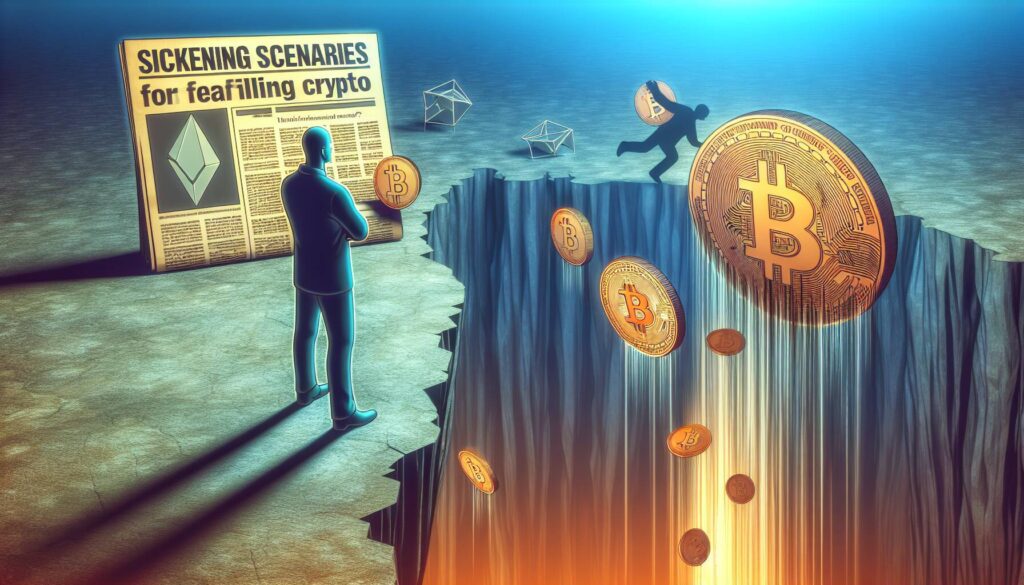This past weekend brought a jolt to the cryptocurrency market, as Bitcoin (BTC) experienced a steep decline, dropping well below the 0K threshold. This significant downturn was closely tied to escalating trade disputes in the United States, particularly following President Donald Trump’s announcement of extensive new tariffs. Specifically, a staggering 25% tariff was placed on imports from Canada and Mexico, alongside a 10% tariff on goods from China. With these shifts, the broader digital asset market mirrored Bitcoin’s decline, marking one of the largest sell-offs since the dual crises of the Covid outbreak and the collapse of the FTX platform.
As global economies grapple with the ramifications of these trade disputes, the crypto market is not spared from the ripples of uncertainty. While Canada’s and Mexico’s initial retaliation led to temporary agreements delaying the imposition of U.S. tariffs, China has promptly responded by implementing its own tariffs against U.S. goods. This string of events has injected new levels of unpredictability into both traditional markets and cryptocurrency, raising questions about the evolving role of crypto amid ongoing economic tensions.
“Tariff wars create uncertainty in traditional markets, often driving investors toward alternative assets like bitcoin, ether and other cryptocurrencies.”
In times of economic fluctuation, cryptocurrencies occasionally present themselves as a “safe haven,” drawing interest from investors looking to safeguard their assets. However, despite growing institutional interest in cryptocurrency, these digital assets continue to exhibit sharp volatility. Recent trade dynamics could trigger additional price swings in the short term, as policy changes lead to rapid shifts in investor sentiment.
Moreover, the impact of tariffs extends further, affecting crypto mining. The industry is notably reliant on specialized hardware, much of which is manufactured in countries like China. As tariffs impose higher production costs for essential electronic components and mining rigs, smaller mining operations might struggle to remain profitable, potentially centralizing mining activities among larger players capable of weathering these financial challenges.
“Tariff wars don’t just impact physical goods; they can also influence financial regulations.”
The ongoing trade wars may also reshape the regulatory landscape for cryptocurrencies. As governments use financial regulations as a lever in their tariff disputes, crypto transactions could face heightened scrutiny, leading to stricter compliance measures. Although this regulatory shift could hinder the adoption of cryptocurrencies, it may inadvertently encourage users to explore decentralized finance (DeFi). With a growing discontent for conventional banking systems influenced by trade policies, many may seek the autonomy offered by DeFi platforms, which facilitate peer-to-peer transactions without intermediaries.
As the complexities of trade disputes unravel, the future of cryptocurrencies hangs in a delicate balance. With potential mining disruptions and regulatory challenges emerging, the short term may indeed look rocky for Bitcoin and its counterparts. Nonetheless, as the push for solutions outside traditional finance intensifies, cryptocurrencies may just find a stronger foothold in this ever-evolving digital economy.

Impact of Trade Disputes on Bitcoin and Crypto Markets
Recent trade disputes, particularly tariffs applied by the U.S., have led to significant turmoil in cryptocurrency markets. Here are the key points that outline the implications for investors and the future of digital assets:
- Bitcoin’s Price Drop:
- Bitcoin (BTC) fell below the 0K mark due to trade tensions, marking a major sell-off.
- This event reflects the interconnectedness of global markets and speculates on the future stability of cryptocurrencies.
- Market Volatility:
- Trade disputes fuel uncertainty in traditional markets, which may lead investors to alternative assets like cryptocurrencies.
- Bitcoin and other cryptos can act as safe havens during economic turbulence, but they also experience significant volatility.
- Mining Disruptions:
- Tariffs on electronic components, particularly for mining equipment from China, can escalate production costs for miners.
- Increased expenses may reduce profitability and centralize mining power among larger players, affecting the decentralized nature of cryptocurrencies.
- Regulatory Uncertainty:
- Governments may use financial regulations in conjunction with tariffs, which could complicate international transactions in crypto.
- Increased scrutiny may slow down adoption rates and create barriers for end-users, especially in tariff-affected regions.
- Rise of Decentralized Finance (DeFi):
- Trade conflicts may encourage a shift towards DeFi solutions, allowing users to bypass traditional banking systems.
- DeFi platforms facilitate peer-to-peer transactions, potentially increasing usage amid regulatory changes.
As global trade tensions rise, the complex relationship between geopolitics and digital assets becomes increasingly relevant for investors, miners, and policymakers. Staying informed about these developments is crucial for navigating the evolving landscape of cryptocurrency.
Tariff Wars and the Ripple Effect on Cryptocurrency: Analyzing the Fallout
Over the last weekend, Bitcoin’s dramatic descent below the 0K threshold highlights how susceptible the cryptocurrency market is to broader economic tensions. This situation arises in the wake of significant tariff announcements from the U.S., particularly targeting imports from Canada, Mexico, and China. The subsequent market reactions painted a large red picture across the digital asset landscape, evoking memories of past crises such as the FTX collapse and the early pandemic market chaos.
Competitive Advantages: As institutional interest in cryptocurrencies grows, their perception as an alternative asset class is also gaining traction. High volatility traditionally encourages investors seeking refuge in digital currencies, akin to gold during economic instability. The increased disillusionment with traditional finance systems — exacerbated by ongoing trade disputes — may accelerate the adoption of decentralized finance (DeFi). A growing number of users could seek the autonomy offered by DeFi platforms, providing a potential silver lining for the crypto industry amidst the turmoil.
Competitive Disadvantages: On the flip side, the implications of tariff wars extend beyond a simple price dip. Tariffs on essential electronic components used in crypto mining operations could exacerbate production costs, thereby sidelining smaller miners. This could lead to a dangerous centralization of mining activities, diminishing the decentralized ethos that underpins cryptocurrencies. Furthermore, regulatory scrutiny on international crypto transactions may heighten, potentially stifling the growth of the industry by making compliance more burdensome for users and exchanges alike.
This turbulent environment could significantly benefit larger, well-capitalized firms that can absorb increased costs, whereas smaller entities may face existential challenges. Investors are often left grappling with the uncertainty permeating the market, as they must navigate ramifications from foreign policy that could influence crypto assets. Individuals turning to decentralized platforms for autonomy may find themselves caught in a double-edged sword, experiencing the conflicting nature of regulation and freedom.
As trade disputes continue to unfold, the dynamic between cryptocurrencies and traditional financial structures is ripe for change. For savvy investors and policymakers, understanding these developments will be critical. The evolving landscape could present unique opportunities for those positioned to capitalize on a shift towards decentralized solutions while simultaneously posing significant challenges for those tied to outdated frameworks. In a world increasingly driven by geopolitical tensions, the future of digital assets will likely reflect the ongoing struggle for economic control and autonomy.















